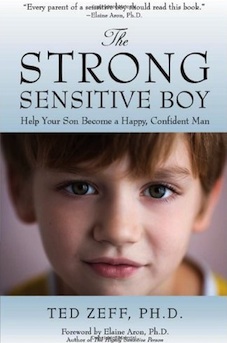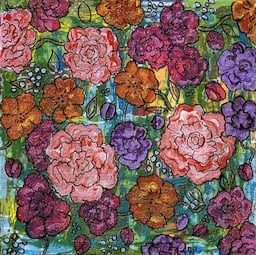 Today I have the pleasure of interviewing Ted Zeff, Ph.D., author of “The Highly Sensitive Person’s Survival Guide,” “The Highly Sensitive Person’s Companion,” and “The Strong, Sensitive Boy.” He currently teaches workshops and consults internationally on coping strategies for highly sensitive people and sensitive boys. Visit his web site, www.drtedzeff.com.
Today I have the pleasure of interviewing Ted Zeff, Ph.D., author of “The Highly Sensitive Person’s Survival Guide,” “The Highly Sensitive Person’s Companion,” and “The Strong, Sensitive Boy.” He currently teaches workshops and consults internationally on coping strategies for highly sensitive people and sensitive boys. Visit his web site, www.drtedzeff.com.
Question: What are the five most prominent qualities of highly sensitive boys?
Dr. Zeff: Approximately twenty percent of the population is highly sensitive and the trait is equally divided between males and females. In other words, approximately twenty percent of all males are highly sensitive, or one out of every five boys has a finely tuned nervous system.
A highly sensitive boy has trouble screening out stimuli and can be easily overwhelmed by noise, crowds and time pressure. The highly sensitive boy (HSB) tends to be very sensitive to pain and violent movies. He may also be made extremely uncomfortable by bright lights, strong smells and changes in his life.
The highly sensitive boy generally reacts more deeply and exhibits more emotional sensitivity than the non-HSB. However, the degree of emotional and physiological reactions varies in each boy.
Most sensitive boys tend to pause to reflect before acting and would not be considered risk-takers. This tendency can easily be understood as demonstrating a healthy caution.
The HSB is conscientious, sensitive to his environment, and socially aware of others around him. Although many cultures tend to categorize sensitive boys as being unusual or not normal, the trait is basically neutral.
Question: Do you think it’s more difficult to be a sensitive boy than girl?

Dr. Zeff: There are many more challenges for HSBs than HSGs (highly sensitive girls) due to societal values that males should be aggressive, thick-skinned, and emotionally self-controlled, which is the antithesis of a highly sensitive boy.
Most boys are taught from an early age to act tough and repress their emotions. Whenever boys do not conform to the “boy code” and instead show their gentleness and emotions, they are usually ostracized and humiliated. If boys express emotions such as fear, anxiety, or sadness, they are commonly seen as feminine, and frequently the adults and other children in their lives typically treat them as though these emotions are abnormal for a boy.
Given our societal norms, it may come as a surprise that one study showed that baby boys cry more than baby girls when they are frustrated; yet by the age of five, most boys suppress all their feelings except anger. The effect on males of having to conform to wearing a tough-guy mask creates suffering on both a personal and societal level and is particularly devastating for the sensitive boy, who has to try harder than the average boy to repress his emotions.
Since the eighty percent of non-HSBs are hardwired neurologically to behave in a different manner than the twenty percent of HSBs, highly sensitive boys do not fit in with the vast majority of boys. As they grow and become socialized, they begin to see their innate gentleness, emotionality, and tendency toward overstimulation as abnormal and wrong.
Question: Could you give us five ways our boys can use their sensitivity to their advantage?
Dr. Zeff: In my study of thirty sensitive men from five different countries, all of the HSMs (highly sensitive males) in my survey indicated that throughout their life they “usually” or “always” have been: creative, compassionate, intuitive, gentle, responsible, a peacemaker, and good at counseling people. HSBs share these traits with such famous highly sensitive males as Abraham Lincoln; the great psychologist Carl Jung, Wolfgang Amadeus Mozart and with many of the great male spiritual teachers.
Sensitive boys have a proclivity toward deep spiritual experiences which helps them find peace and stability, as well as a stronger sense of their own value and purpose. When HSBs work in conditions that suit their sensitivity in school, they often produce better quality work due to their careful, creative, and conscientious temperament.
The HSB’s intuition and ability to notice subtleties in the environment helps strengthen their relationships. The HSB’s sensitivity may help them have a better tactile sense than non-HSBs, which gives an advantage when a delicate touch is needed such as performing tasks that require refined movement and dexterity. Sensitive boys also experience deep joy from their involvement in the arts and creative endeavors, such as listening to or making music.
In order for a society to function at an optimal level, there has to be a balance between the highly sensitive male (HSM) and non-HSM styles. While non-HSMs will be found among soldiers and chief executive officers of large corporations, and the HSMs will more often be counselors, artists, and healers, I think HSMs can function in almost any occupation so long as they do it their way, thoughtfully and without unnecessary aggression. The point is, societies that ultimately succeed and flourish are the ones that honor both the aggressive warriors and the sensitive advisers. The sensitive male has an important mission, which is to balance the aggressive behavior of some nonsensitive males who treat humans, animals, and Mother Nature in a callous fashion.
Question: Are there differences in the manner sensitive boys are treated in different cultures?
Dr. Zeff: While biological factors may influence the behavior of boys, what a particular society values is an equally important factor in determining how the sensitive boy is treated. For example, a study of Canadian and Chinese school children concluded that highly sensitive children in Canada were the least liked and respected, while Chinese sensitive children were the most popular.
The HSMs in my study from India, Thailand, and most HSMs from Denmark stated that they were never or rarely teased at school for their sensitivity which differed from the malicious and cruel taunting that many HSBs experienced in North America. Sensitive boys growing up in Denmark, Thailand, and India had less difficult experiences about participation in team sports than those from North America.
The sensitive men who were raised in India and Thailand were more likely to have more friends as boys than those raised in Denmark or North America, perhaps since most Asian countries are more communally oriented than the individualistic Western countries.
In countries like India and Thailand, where the positive attributes of sensitive males are recognized, the HSB is often given a leadership position, since others recognize his innate ability to help achieve the group’s goals. The sensitive male in many cultures has been recognized as an “intuitive priestly advisor” and has historically been granted special status for helping the community thrive.
The HSMs from Thailand and India and most of the men from Denmark reported that their teachers treated them with respect and kindness. This is in stark contrast to many of the HSMs who attended public school in North America and reported that teachers frequently shamed them for their sensitivity.
* Click here to subscribe to Beyond Blue and click here to follow Therese on Twitter and click here to join Group Beyond Blue, a depression support group. Now stop clicking.

